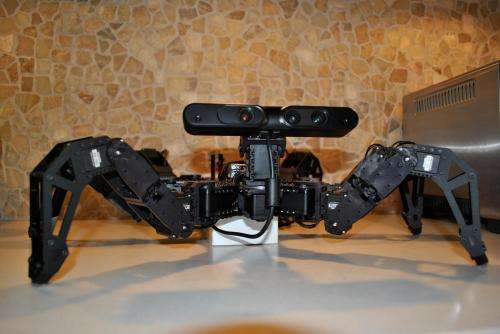June 3, 2013 report
Charlotte robot tells the world where it's not going

(Phys.org) —A resourceful thinker who likes to learn as he goes, Kevin Ochs started out on a project with the intention of brushing up skills in C++ programming. He has come up with something quite interesting as a result. He has a six-legged robot that talks about its progress while navigating obstacles. "This robot project was a mental exercise for me," he said, on "My Raspberry Pi Robot Called Charlotte," his Web page. "It had been several years since I had done anything with C++ and I needed to shore up that skill set."
The Ochs creation, Charlotte, moves about and talks, a design making use of a kit then custom-fashioned by Ochs. First, he turned to the robot shop Trossen Robotics, a business with an ample variety of robot kits and parts. Ochs chose a hexapod robot kit. "I found a robot kit sold by Trossen Robotics that visually seemed interesting and was powered by a Arduino-based controller. I purchased the kit and began learning how it was controlled with the stock code they provided." He then proceeded to make modifications. Mainly, he gave it a "brain" in the form of an overclocked Raspberry Pi computer. ("To note the Rpi is overclocked to 1000Mhz," Ochs said.)
The Raspberry Pi resides in between the Trossen-supplied body. Ochs also applied custom C++ coding with the aid of the Raspberry Pi, his own code based on or inspired by what was done in Phoenix code. He also used openNI (defined as the standard framework for 3-D sensing) and openCV to develop a heads up display and collision detection; openCV stands for Open Source computer vision. It provides a computer vision and machine learning software library, with over 2500 optimized algorithms.
The distinctive edge to Charlotte is that it not only can avoid obstacles by moving out and away from them but can talk about its navigations with the added twist of an open source speech synthesizer, eSpeak. According to the eSpeak site, this is a compact software speech synthesizer for Linux or Windows, which uses a "formant synthesis" method. This allows many languages to be provided in a small size. The speech is clear, but has limitation in that it is not as natural or smooth as larger synthesizers based on human speech recordings.
More information:
charlotte-robot.com/
espeak.sourceforge.net
www.openni.org/about/#.UayvuJzMDow
© 2013 Phys.org





















